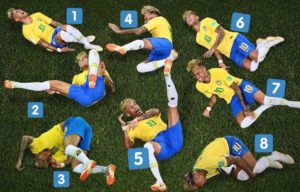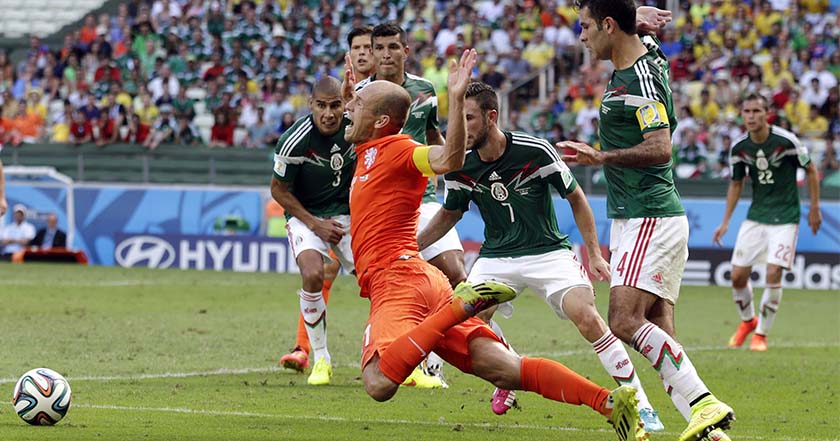All the diving, crying, rolling around is a cancer on the ‘beautiful game’, and it needs to be rooted out
This isn’t a rant about the other shadows that hang over football, such as match fixing. Nor is it about the criminality and violence that come with hooliganism, which is a problem in many countries, not least of which in Colombia. Colombian football clubs attract all manner of barras bravas, ñeros, ratas and other low-life scum. Nor is this even a lament for Colombians’ penchant for killing one another when the national team wins a match.
Each of those is worthy of comment and investigation. But this piece is about all the whining, diving, injury faking, and general dishonesty that is inherent to the sport at every level, and was readily on display in Russia.
Before France won the World Cup by playing a (mostly) clean, honest game, we were treated to a grand spectacle of theatrics – and a form of cheating that is so ingrained in the world’s most popular sport that some teams even train their players how to fall down and cry convincingly. Watching close to all the tournament matches, a casual, nonscientific football dive tally revealed that the players who were best at impersonating gunshot victims on the pitch hailed from Portugal (can you guess who?), Colombia (surprisingly not James), England, Spain, Senegal, Argentina, Uruguay (can you guess who?) and, of course, Brazil’s diver-in-chief, Neymar da Silva Santos Junior.

He’s Got Moves: Neymar shows off the eight fundamentals of football diving, crying, and generally acting like a pansy.
It usually takes place in or near the penalty area. A defender will draw near to an attacker, and the attacker will launch himself into the air and land in a dramatic rolling motion, and cry out in apparent agony. He’ll cover his face with his hands or grab his ankle and continue flopping around on the ground, the pain too much to bear – but not so much that he can’t momentarily raise their hands up to the referee to protest the grave injustice done to him. More often than not, the referee awards the aggrieved player a free kick, or, if the dive took place inside the box, a penalty kick, and may even punish the offending defender with a yellow card. The ruse is complete and the aspiring actor has flopped his way into a good chance at a goal, and perhaps even victory.
To those who are brought up in countries with little or no tradition of football, like the United States, Canada, Australia, and in other places (mostly where they call football ‘soccer’) witnessing this display can provoke a range of reactions. Everything from dismissive laughter to embarrassment for the prima donna writhing around on the ground, to outright hatred of the fakery. But the baseline emotion that is evoked in these cultures is an offense to the idea of sportsmanship – the virtues of strength, speed, toughness, selflessness, but most of all, fairness – essentially values and attitudes that are taught and celebrated in every other sport except football.
And so long as shameful displays are rewarded by officials instead of frowned upon by fans and punished by officials, then they will continue, and large parts of the world will continue to look upon football at all levels with scorn.
Football Diving, Crying as Strategy
Footballers take dives for one very obvious reason – to draw a foul. It means a referee can stop the run of play, award a free kick, even eject the offending player. For a foul in front of the opponent’s goal, this can be a penalty kick, which is a direct shot on the goal by any player of the team’s choosing. Because every goal is so impactful, drawing a penalty yields a much bigger advantage in football than, say, free throws in basketball. Officially, taking an intentional dive is an infraction in its own right, but it is seldom ever called. Even ill-executed and obviously fake football diving is almost never ever punished; most of the time the official will run over to the diver and signal for play to continue (and for the diver to get off his ass). A clear signal is given: taking a dive – even an obvious one – will go unpunished, and the harder you cry the more likely you will be awarded a free kick.
There has even been research into the phenomenon. After examining 60 football matches in 10 leagues across the globe, researchers deduced that players were twice as likely to take a dive when attacking in the opponent’s goal than when playing defence, and twice as likely to dive/cry when the game was tied than when the diver’s team was winning or losing. They were also more likely to draw a foul the more often that dives were employed.
International football is big business. The so-called ‘big five’ European leagues had a market size of €25.5 billion euros in 2016-2017, and that’s just in Europe. With so much money on the line, and like in other professional sports markets, winning isn’t everything, it’s the only thing. As so much is riding on each match, why wouldn’t you take a dive? Some of the best footballers on the planet fall, as if taking a gunshot to the chest under imaginary contact to dupe the referee into awarding a penalty, or thrash around feigning intense pain in order milk the clock and give their teammates a breather.
Small wonder, then, that someone like Neymar is completely shameless and unapologetic about his now-global reputation for his fall-down, cry-on-the-pitch-bitch routine. Doing so has brought him past success – most recently in Brazil’s 2-0 knockout win over Mexico – so he can dismiss critics as sore losers, and condemnation and mockery on social media as attempts to throw him off his game.
“I think it’s more an attempt to undermine me than anything else. I don’t much care for criticism, not even for praise because this can influence in a way the athlete’s attitude. In the last two matches I didn’t talk to the press because there are too many people talking, getting excited. I don’t know if they’re showing off. I am here to win with my teammates,” Neymar said on July 2 after his side beat Mexico.
In Defense of Diving
In many footballing cultures, the dishonest practice is not only tolerated, it is sometimes praised. In Argentina, and probably in other countries, perfecting the dive is a part of training. “In Argentina, yes, the people sometimes practice [footbal diving], it’s true. But many years ago. Now I don’t know. But when I was a player always it was part of training to try to cheat. At Newell’s, many, many years ago it was part of practice,” former Argentine footballer and current Tottenham Hotspur manger Mauricio Pochettino once confessed.
In May of this year, the Tunisian national team played two international friendlies during the month of Ramadan, when observant Muslims fast during the daylight hours. The team was in a weakened state from not having eaten all day, but towards the end of both of their matches, as the sun went down, the goalkeeper collapsed and feigned an injury. As soon as he did so, his team scurried over to the sideline to eat dates and drink water.
This obvious ploy to help the team fight off fatigue worked, and Tunisia came back to draw 2-2 in both games. Instead of calling out obvious cheating – hungry or not – the BBC News celebrated the ruse as “ingenious.”
Fun fact:
Tunisian National team has played the last two friendlies while fasting. So, whenever the time comes to break Fast. The players have an agreement that the GK would go down so they can get a moment to drink some water and get something to eat 😂😂#Ramadan #tunisia pic.twitter.com/4Rgz380ukW— Souhail Khmira (@SKhmira) June 2, 2018
Officially the term for football diving is called “simulation,” and it’s becoming so prevalent, even in places like Britain, that some pundits have wondered aloud if we just move on and accept that football diving is a part of the game – fairness and sportsmanship be damned.
“Where once we could leap aboard our moral high ground, dismiss [football diving] as a dirty foreign trick, a sad blight on the game, painting ourselves as victims, we are now con artists ourselves. There will be some of you reading this who are appalled I would even suggest we accept it and move on. Your numbers are dwindling because there seems to be a growing tendency for people to shrug their shoulders and argue you win by any means necessary these days,” football commentator Luke Edwards wrote in the Telegraph in 2016.
He continued: “Diving is in danger of becoming acceptable. Perhaps it already is. If this is the case, then we have to get on with it. If it happens abroad, why shouldn’t it happen here? Why should we continue to be victims when we can also play by the same unwritten rules to gain an advantage?”

England’s Jordan Henderson, (crying), reacts to the searing pain of a ninja-like “headbutt” delivered by Colombia’s Wilmar Barrios (no. 5), during the match between the two nations on July 3. Henderson’s reaction had nothing to do with the fact that he was inside Colombia’s penalty box.
It is indeed accepted, explained away as a necessary practice, or flat-out ignored among the football faithful here in Colombia. It’s a safe bet that this is also true across the length and breadth of Latin America, and it’s no small coincidence that some of the most prolific divers and criers in the world happen to be from this continent.
But the cancer of football diving is in metastasis, and appears to have spread to the UK.
Rooting Out Football Diving
There are a few things that could be done to treat the cancer and put football onto a trajectory toward something resembling an honorable sport. From this humble fan’s perspective, here are some suggestions:
- Banning Players for Diving/Crying – For its part, the English Football Association (FA) last year introduced a retrospective diving rule, meaning that if a questionable foul is called and intentional diving is suspected, then a panel of three judges can review the play, and if a player is deemed to have taken a dive, that player will be banned from playing in the next two matches. This is also true of the American MLS League and the Australian A-League. Unfortunately for its part – despite all the bluster, and as evidenced by this World Cup – FIFA has done nothing to treat the cancer that afflicts the so-called ‘beautiful game’ – but that should not surprise anyone. FIFA just so happens to be one of the most corrupt organizations on Earth.
- Yellow/Red Cards Handed Out for Diving – Forgetting for a second that FIFA is a shitty joke, and that probably no Latin American football association would ever consider cleaning up the sport in their neck of the woods (where football diving is taught, after all) – and all that is a lot to forget – employing the new Video Assistant Referee (VAR) in all leagues to determine if the man who happens to be writhing around inside the box in agony was in fact fouled. Even if said player was in fact fouled and deserves a penalty kick, he should be punished with a yellow or red card, depending upon the level of absurdity of the dive and play-acting (crying so long that they’re carted off the field for example). A good example of this already exists in the sport of professional ice hockey. A player who takes a dive in a bid to gain an unfair advantage is penalized for embellishment.
- The Player Who’s Fouled Must Kick – A common occurrence is when a player takes a dive, or is genuinely fouled, anywhere on the field, their team is allowed to substitute whoever was fouled with the best striker on that team, increasing their chances for a goal. The rationale being that even if a shit winger goes down, the star can step in and take the free/penalty kick on his behalf. This should not be the case. The fouled player should have to take that kick, not ‘Golden Boot Boy’. To ensure honesty, if the diver or actually-fouled player is or acts too injured to take the free kick, then he should be removed from the match altogether and immediately seek the medical care he so urgently needs, and his replacement will be tasked with taking the shot, not ‘Johnny Football Hero’.
- Players Who Leave on Stretchers Are Out – So many of the Latin American leagues, as well as the Portuguese and Italians, allow players who are egregiously injured to be assisted off the field either by something resembling a golf cart, or by silly looking cunts dressed up like Red Cross rejects. But you’ve got to hand it to Latin genetics. Once off the pitch, those players almost always miraculously heal up from their wounds with a speed that would make Wolverine from X-Men blush. As anyone with more than a second-grade education will tell you, such miracles don’t exist. What can that possibly mean? The answer: Occam’s Razor cuts deep – these motherfuckers were faking all along, and wasting everyone’s time. The solution? If you get carted/carried off the field, you do not play again in that match, and you also possibly miss the next. A good rule would be one stating that you cannot re-join you team until you are granted a clean bill of health by a doctor not affiliated with the club in question. Safety, after all, should be any league’s biggest priority.
Like the Olympics, the attraction to the so-called ‘beautiful game’ is truly global, even in those countries where football itself isn’t the top draw. But if the sport’s international governing bodies want to really tap into audiences that are not gripped by football fanaticism, then some vision is needed, by any remaining FIFA official unsullied by the bribery scandals, if such a person exists. The more progressive organizations like the FA can do much to be a part of that vision, and act as a benchmark for the future of the sport. Football has been plagued for decades by the cancer of diving and crying. But there is nothing saying that the Neymars of the world must win out. If he and the legions of other players like him are put in their place, then we might rid international football of this cancer and restore some kind of integrity back into the world’s most popular game.
He looks like me when I stub my toe on the coffee table.

Journalist. Misfit. Malcontent. Provocateur. Is a better Colombia is possible? We’re starting to have doubts.


thank you very nice website article
Thanks for the kind words, and thanks for reading Hadil!